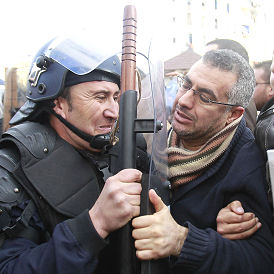Yemen and Algeria protests stifled
Small groups of protesters, following up on the success of the Egyptian revolution, have had their demonstrations closed down by pro-government and security forces in both Yemen and Algeria.

Hoping to capitalise on the other Middle East uprisings, around 2,000 people gathered in the capital of Yemen, Sanaa, to call for the fall of the government at Sanaa University. However, crowds of pro-government demonstors armed with knives and clubs attacked them and broke the protest up
Two people were injured, and there were claims that security forces stood by during the scuffles.
“The Yemeni security forces have a duty to protect peaceful protesters,” said Sarah Leah Whitson, Middle East director at Human Rights Watch. “In this case, security forces seem to have organised armed men to attack the protesters.”
The Yemeni President Ali Abdullah Saleh has already promised to step down at the end of his term in 2013, and last week his party set up tents in Sanaa’s central Tahrir Square to prevent people from gathering there in large numbers.
Party officials have also been giving out small amounts of money to reward pro-government protesters on Saturday.
Some have used the cash to buy food or Qat, a mild green stimulant leaf that more than half of Yemen’s 23 million people chew daily and which has been cited as a deterrent to protest.
The Yemeni government said it respected the choice of the Egyptian people and would support them in their search for progress and development.
In Algeria, thousands of riot police have been preparing to stifle an anti-government protest scheduled for the capital.
Small groups of demonstrators gathered in the square, calling for the removeal of President Abdelaziz Bouteflika and attempted to march through the city. However, riot police forced them to remain in the square and after three hours of being ‘kettled’ hundreds began to leave quietly.
Officials had banned the protests and the police had been preparing for days for it.
“I am sorry to say the government has deployed a huge force to prevent a peaceful march. This is not good for Algeria’s image,” said Mustafa Bouchachi, a leader of the League for Human Rights which helped organise the protest.
However it appears the protest lacked significant backing from the main trade unions or the biggest opposition parties. Nearly all members of Algeria’s radical Islamist groups, which were banned in the 1990s but still have great influence, also stayed away.
-
Latest news
-
Taylor Swift’s new break-up album breaks records3m

-
NHS trust fined £200K for failings that led to death of two mental health patients3m

-
Sunak vows to end UK ‘sick note culture’ with benefit reform3m

-
‘Loose talk about using nuclear weapons is irresponsible and unacceptable’, says head of UN’s nuclear watchdog3m

-
‘There wasn’t an Israeli attack on Iran,’ says former adviser to Iran’s nuclear negotiations team7m

-




